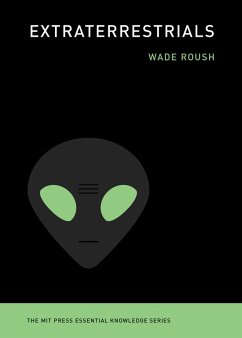Are we alone in the universe? If not, where is everybody? An engaging exploration of one of the most important unsolved problems in science.
Everything we know about how planets form and how life arises suggests that human civilization on Earth should not be unique. We ought to see abundant evidence of extraterrestrial activity—but we don't. Where is everybody? In this volume in the MIT Press Essential Knowledge series, science and technology writer Wade Roush examines one of the great unsolved problems in science: is there life, intelligent or otherwise, on other planets?
This paradox (they're bound to be out there; but where are they?), first formulated by the famed physicist Enrico Fermi, has fueled decades of debate, speculation, and, lately, some actual science. Roush lays out the problem in its historical and modern-day context and summarizes the latest thinking among astronomers and astrobiologists. He describes the long history of speculation about aliens (we've been debating the idea for thousands of years); the emergence of SETI (the Search for Extraterrestrial Intelligence) as a scientific discipline in the 1960s, and scientists' use of radio and optical techniques to scan for signals; and developments in astrobiology (the study of how life might arise in non-Earth like environments) and exoplanet research (the discovery of planets outside our solar system). Finally, he discusses possible solutions to the Fermi Paradox and suggests way to refocus SETI work that might increase the chances of resolving the paradox—and finding extraterrestrials.
Everything we know about how planets form and how life arises suggests that human civilization on Earth should not be unique. We ought to see abundant evidence of extraterrestrial activity—but we don't. Where is everybody? In this volume in the MIT Press Essential Knowledge series, science and technology writer Wade Roush examines one of the great unsolved problems in science: is there life, intelligent or otherwise, on other planets?
This paradox (they're bound to be out there; but where are they?), first formulated by the famed physicist Enrico Fermi, has fueled decades of debate, speculation, and, lately, some actual science. Roush lays out the problem in its historical and modern-day context and summarizes the latest thinking among astronomers and astrobiologists. He describes the long history of speculation about aliens (we've been debating the idea for thousands of years); the emergence of SETI (the Search for Extraterrestrial Intelligence) as a scientific discipline in the 1960s, and scientists' use of radio and optical techniques to scan for signals; and developments in astrobiology (the study of how life might arise in non-Earth like environments) and exoplanet research (the discovery of planets outside our solar system). Finally, he discusses possible solutions to the Fermi Paradox and suggests way to refocus SETI work that might increase the chances of resolving the paradox—and finding extraterrestrials.
Dieser Download kann aus rechtlichen Gründen nur mit Rechnungsadresse in A, B, BG, CY, CZ, D, DK, EW, E, FIN, F, GR, HR, H, IRL, I, LT, L, LR, M, NL, PL, P, R, S, SLO, SK ausgeliefert werden.
"Whatever your viewpoint, this is an excellent guide and introduction to SETI with plenty of insightful anecdotes, glossary, notes, further reading list, and index." Starburst Magazine
"All the various solutions to Fermi s paradox are discussed from the pragmatic to the bizarre in this clear, concise and engagingly written book. It is a perfect stepping off place for anyone wishing to investigate how far we have come in answering one of the biggest questions in science: are we alone in the Universe?" BBC Sky at Night Magazine
"A handy, easy-to-read guide to what E.T. might look like, and how we re going about finding him." Daily Beast
"All the various solutions to Fermi s paradox are discussed from the pragmatic to the bizarre in this clear, concise and engagingly written book. It is a perfect stepping off place for anyone wishing to investigate how far we have come in answering one of the biggest questions in science: are we alone in the Universe?" BBC Sky at Night Magazine
"A handy, easy-to-read guide to what E.T. might look like, and how we re going about finding him." Daily Beast

